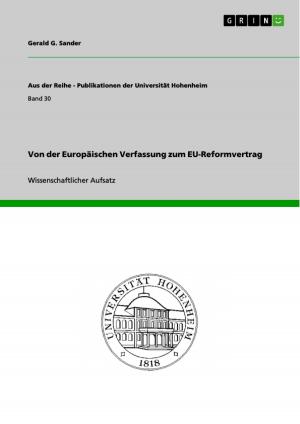Modernity and Tradition in Chinua Achebe's 'Girls at War' and Ngugi Wa Thiong'o's 'A Meeting in the Dark'
Fiction & Literature, Literary Theory & Criticism| Author: | Ana María Leiva Aguilera | ISBN: | 9783668073913 |
| Publisher: | GRIN Verlag | Publication: | October 23, 2015 |
| Imprint: | GRIN Verlag | Language: | English |
| Author: | Ana María Leiva Aguilera |
| ISBN: | 9783668073913 |
| Publisher: | GRIN Verlag |
| Publication: | October 23, 2015 |
| Imprint: | GRIN Verlag |
| Language: | English |
Literature Review from the year 2015 in the subject Literature - Africa, grade: A, University of Jaén, language: English, abstract: The aim of this essay is to analyse two short African stories, each of them belonging to different areas. I will be focusing my attention on Chinua Achebe from Nigeria (West Africa), author of the short story 'Girls at War', and Ngugi Wa Thiong'o's 'A Meeting in the Dark', from Kenya (East Africa). Nonetheless, both short stories share an important contrast between modernity (as a result of European influence on the part of colonizers) and tradition (the combination of cultural and social features characterizing African people's identity). Language acts as another element which divides tradition (aboriginal languages) and modernity (language of the colonizer): Ngugui wa Thiong'o supported the unique use of African languages in literature but it was after he wrote this story, which he wrote in English. He said that the language of the colonizer was a symbol of his identity, a way of accepting European culture. On the contrary, Achebe decided to write in English because he wanted to address to the whole nation by means of a central language. He even considered that the use of English opened up more opportunities for his message to be read throughout Europe. This Western cultural background and clash between European and original African identities results in the concept of cultural syncretism, which will be a key concept for this analysis. These short stories are written literary proof of how African people found themselves in a constant fight to keep their original believes and traditions, trying to achieve success through European literacy but never being accepted as fully Westernized, nor as fully Africans anymore.
Graduada en Estudios ingleses con dos menciones: Lingüística aplicada y Literaturas. Máster en Ed. Secundaria. Máster OMIES Ujaen Becaria Ujaen Becaria telefónica
Literature Review from the year 2015 in the subject Literature - Africa, grade: A, University of Jaén, language: English, abstract: The aim of this essay is to analyse two short African stories, each of them belonging to different areas. I will be focusing my attention on Chinua Achebe from Nigeria (West Africa), author of the short story 'Girls at War', and Ngugi Wa Thiong'o's 'A Meeting in the Dark', from Kenya (East Africa). Nonetheless, both short stories share an important contrast between modernity (as a result of European influence on the part of colonizers) and tradition (the combination of cultural and social features characterizing African people's identity). Language acts as another element which divides tradition (aboriginal languages) and modernity (language of the colonizer): Ngugui wa Thiong'o supported the unique use of African languages in literature but it was after he wrote this story, which he wrote in English. He said that the language of the colonizer was a symbol of his identity, a way of accepting European culture. On the contrary, Achebe decided to write in English because he wanted to address to the whole nation by means of a central language. He even considered that the use of English opened up more opportunities for his message to be read throughout Europe. This Western cultural background and clash between European and original African identities results in the concept of cultural syncretism, which will be a key concept for this analysis. These short stories are written literary proof of how African people found themselves in a constant fight to keep their original believes and traditions, trying to achieve success through European literacy but never being accepted as fully Westernized, nor as fully Africans anymore.
Graduada en Estudios ingleses con dos menciones: Lingüística aplicada y Literaturas. Máster en Ed. Secundaria. Máster OMIES Ujaen Becaria Ujaen Becaria telefónica















